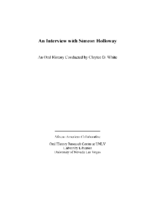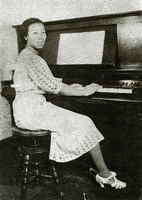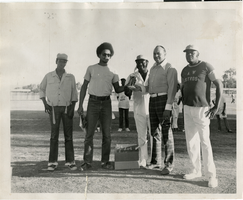Search the Special Collections and Archives Portal
Search Results
Nona Carroll oral history interviews
Identifier
Abstract
Oral history interviews with Nona Carroll conducted by Claytee D. White on July 06, 2018 and July 16, 2018 for the African Americans in Las Vegas: a Collaborative Oral History Project. In the first interview, Carroll discusses her family background and early life in St. Louis, Missouri. She recalls moving to Las Vegas, Nevada in 1987, her employment with Computer Software Analyst, Inc., and working at Nellis Air Force Base. In the second interview, Carroll talks about her community involvement in Las Vegas and her membership with the Summerlin Women’s Club. Lastly, Carroll discusses the organization J.U.G.S. (Justice, Unity, Generosity, Service, Inc.) and the Girl Friends, Inc.
Archival Collection

Transcript of an Interview with Simeon Holloway by Claytee D. White, April 19 and 20, 2013
Date
Archival Collection
Description
Interview with Simeon Holloway by Claytee D. White on April 19 and 20, 2013. Holloway was a member of the first all-black Navy band in the 1940s. He moved to Las Vegas in 1985 and has been active in music and land investment.
Text

Photograph of Marcia Washington, junior year of high school, 1970
Date
Archival Collection
Description
Color photograph of Marcia Washington in her junior year at Valley High School, Las Vegas, 1970.
Image

Photograph of Audrey James (age 21) at her piano, circa 1935
Date
Archival Collection
Description
Black and white photograph of Audrey James, age 21, sitting at her piano.
Image

Photograph of Aaron Williams presenting a trophy to a group of adults, ca. 1970
Date
Archival Collection
Description
Black and white photograph of Aaron Williams (plaid pants) presenting a trophy to a group of four men, ca. 1970. The man at right wears an "A.W. Astros" t-shirt.
Image

Photograph of Eddie and Johnie Wright's three children, November 7, 1969
Date
Archival Collection
Description
Black and white photograph of Rueben Wright (age 7), Jeff Wright (age 10) and Hermina Wright (age 11), 1969.
Image
Jacqueline Barker oral history interview
Identifier
Abstract
Oral history interview with Jacqueline Barker conducted by Claytee D. White on February 14, 2013 for the African Americans in Las Vegas: a Collaborative Oral History Project. In this interview, Barker discusses her upbringing in Las Vegas, Nevada and growing up in the Westside. She talks about the importance of the church in the Westside and the significance of education in her family. Barker remembers her father’s involvement with school integration in Las Vegas, the sixth grade centers, and the racism she experienced while attending the University of Nevada, Reno during the 1970s. Later, Barker compares her experience in higher education to that of her mother’s, and the race riots in 1969. Lastly, Barker discusses the history of African Americans in unions, her career in education, and the social and psychological impacts that African Americans faced in Las Vegas.
Archival Collection
Audio recording clip from the fifth interview with Senator Joe Neal by Claytee D. White, June 1, 2006
Date
Archival Collection
Description
Part of an interview with Senator Joe Neal by Claytee White on June 1, 2006. Neal talks about his work in local government and working to prevent fraud in the election of Aaron Williams, the first African American North Las Vegas city councilman.
Sound
Joel Coombs oral history interview
Identifier
Abstract
Oral history interview with Joel Coombs conducted by Claytee White on February 22, 2014 for the African Americans in Las Vegas: a Collaborative Oral History Project. In this interview Joel Coombs spoke about how his peers reacted to his interracial family. He recalls attending Valley High School amidst racial tensions, racism, and prejudice. He also spoke about the drug abuse happening at Valley High School and Bishop Gorman High School in Nevada. He recalled participating in protests as a child and landing on the front page of The Post.
Archival Collection
Ida Pinckney oral history interviews
Identifier
Abstract
Oral history interviews with Ida Pinckney conducted by Claytee D. White on August 23, 2012 and November 05, 2012 for the African Americans in Las Vegas: a Collaborative Oral History Project. In this interview, Pinckney discusses her personal history and life in Las Vegas, Nevada after moving there with her family as a child in 1942. She begins by talking about her family and living in a tent house in the Westside community of Las Vegas. Pinckney describes how she feels Westside development has been stunted by an overabundance of churches in the area not paying taxes, life in the Westside during the 1940s, and her experiences as an African American woman in Las Vegas. Other topics of discussion include Pinckney being a member of Culinary Workers Union Local 226, her father and brother working at the Nevada Test Site, and various aspects of Las Vegas history. Willie Jean Beatty also participates in the interview, helping Pinckney expand on topics such as the presence of organized crime in casinos and her involvement in the Sisters Network: An Afro-American Breast Cancer Survivors Organization.
Archival Collection
